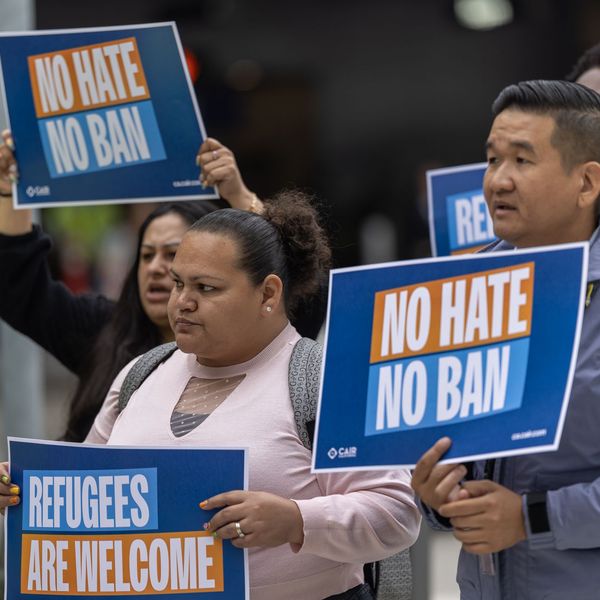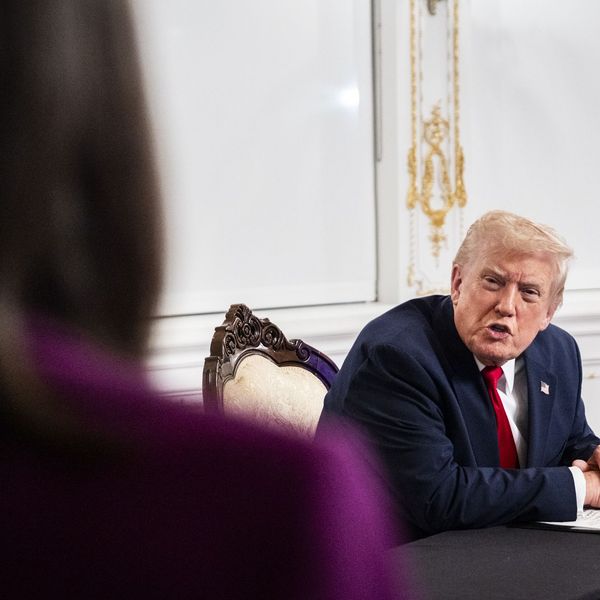Trump to State Dept. Officials Objecting to Muslim Ban: 'Get with the Program or... Go'
If Monday's White House press briefing is any indication, internal dissent will not be tolerated under Trump
First of all, those objecting to a White House executive order which sowed "chaos, heartbreak, and resistance" at airports across the United States over the weekend are blowing things "out of proportion." And secondly, those inside the government who oppose President Donald Trump's blanket ban on guests, immigrants, and refugees from seven Muslim-majority countries have just two choices at this point: get in line or get lost.
Those were the two key takeaways from remarks by White House press secretary Sean Spicer on Monday afternoon when asked to account for the controversial ban and a draft dissent cable put forth by State Departments employees, and obtained by news outlets, officially challenging the order.
The internal memo (pdf)--which is marked "sensitive but unclassified" and that dozens of career employees have or are expected to sign as a formal registration of dissent--argues that the hastily ordered ban "runs counter to core American values of nondiscrimination, fair play, and extending a warm welcome to foreign visitors and immigrants."
As of Monday morning, reports the Washington Post, "edits and signatures were still being collected in advance of submitting the memo to State Department leadership."
At an early afternoon press briefing, Spicer said the ban imposed by Trump has been "blown way out of proportion" and dismissed those challenging it, including any State Department officials who might back the dissent cable.
"I think they should either get with the program or they can go," Spicer responded when asked if the administration was aware of its circulation and what he thought of those who might back its message.
Beyond the core moral objections, the letter from the career diplomats argues that Trump's ban is actually counterproductive in terms of its claimed purpose, which is to keep the American people more safe. According to the document:
Despite the Executive Order's focus on them, a vanishingly small number of terror attacks on U.S. soil have been committed by foreign nationals who recently entered the United States on an immigrant or nonimmigrant visa. Rather, the overwhelming majority of attacks have been committed by native-born or naturalized U.S. citizens--individuals who have been living in the United States for decades, if not since birth. In the isolated incidents of foreign nationals entering the U.S. on a visa to commit acts of terror, the nationals have come from a range of countries, including many (such as Pakistan or Saudi Arabia) which are not covered by the Executive Order.
"We do not need to place a blanket ban that keeps 220 million people--men, women, and children--from entering the United States to protect our homeland. We do not need to alienate entire societies to stay safe," the memo concludes. "And we do not need to sacrifice our reputation as a nation which is open and welcoming to protect our families. It is well within our reach to create a visa process which is more secure, which reflects our American values, and which would make the Department proud."
An Urgent Message From Our Co-Founder
Dear Common Dreams reader, The U.S. is on a fast track to authoritarianism like nothing I've ever seen. Meanwhile, corporate news outlets are utterly capitulating to Trump, twisting their coverage to avoid drawing his ire while lining up to stuff cash in his pockets. That's why I believe that Common Dreams is doing the best and most consequential reporting that we've ever done. Our small but mighty team is a progressive reporting powerhouse, covering the news every day that the corporate media never will. Our mission has always been simple: To inform. To inspire. And to ignite change for the common good. Now here's the key piece that I want all our readers to understand: None of this would be possible without your financial support. That's not just some fundraising cliche. It's the absolute and literal truth. We don't accept corporate advertising and never will. We don't have a paywall because we don't think people should be blocked from critical news based on their ability to pay. Everything we do is funded by the donations of readers like you. Will you donate now to help power the nonprofit, independent reporting of Common Dreams? Thank you for being a vital member of our community. Together, we can keep independent journalism alive when it’s needed most. - Craig Brown, Co-founder |
First of all, those objecting to a White House executive order which sowed "chaos, heartbreak, and resistance" at airports across the United States over the weekend are blowing things "out of proportion." And secondly, those inside the government who oppose President Donald Trump's blanket ban on guests, immigrants, and refugees from seven Muslim-majority countries have just two choices at this point: get in line or get lost.
Those were the two key takeaways from remarks by White House press secretary Sean Spicer on Monday afternoon when asked to account for the controversial ban and a draft dissent cable put forth by State Departments employees, and obtained by news outlets, officially challenging the order.
The internal memo (pdf)--which is marked "sensitive but unclassified" and that dozens of career employees have or are expected to sign as a formal registration of dissent--argues that the hastily ordered ban "runs counter to core American values of nondiscrimination, fair play, and extending a warm welcome to foreign visitors and immigrants."
As of Monday morning, reports the Washington Post, "edits and signatures were still being collected in advance of submitting the memo to State Department leadership."
At an early afternoon press briefing, Spicer said the ban imposed by Trump has been "blown way out of proportion" and dismissed those challenging it, including any State Department officials who might back the dissent cable.
"I think they should either get with the program or they can go," Spicer responded when asked if the administration was aware of its circulation and what he thought of those who might back its message.
Beyond the core moral objections, the letter from the career diplomats argues that Trump's ban is actually counterproductive in terms of its claimed purpose, which is to keep the American people more safe. According to the document:
Despite the Executive Order's focus on them, a vanishingly small number of terror attacks on U.S. soil have been committed by foreign nationals who recently entered the United States on an immigrant or nonimmigrant visa. Rather, the overwhelming majority of attacks have been committed by native-born or naturalized U.S. citizens--individuals who have been living in the United States for decades, if not since birth. In the isolated incidents of foreign nationals entering the U.S. on a visa to commit acts of terror, the nationals have come from a range of countries, including many (such as Pakistan or Saudi Arabia) which are not covered by the Executive Order.
"We do not need to place a blanket ban that keeps 220 million people--men, women, and children--from entering the United States to protect our homeland. We do not need to alienate entire societies to stay safe," the memo concludes. "And we do not need to sacrifice our reputation as a nation which is open and welcoming to protect our families. It is well within our reach to create a visa process which is more secure, which reflects our American values, and which would make the Department proud."
First of all, those objecting to a White House executive order which sowed "chaos, heartbreak, and resistance" at airports across the United States over the weekend are blowing things "out of proportion." And secondly, those inside the government who oppose President Donald Trump's blanket ban on guests, immigrants, and refugees from seven Muslim-majority countries have just two choices at this point: get in line or get lost.
Those were the two key takeaways from remarks by White House press secretary Sean Spicer on Monday afternoon when asked to account for the controversial ban and a draft dissent cable put forth by State Departments employees, and obtained by news outlets, officially challenging the order.
The internal memo (pdf)--which is marked "sensitive but unclassified" and that dozens of career employees have or are expected to sign as a formal registration of dissent--argues that the hastily ordered ban "runs counter to core American values of nondiscrimination, fair play, and extending a warm welcome to foreign visitors and immigrants."
As of Monday morning, reports the Washington Post, "edits and signatures were still being collected in advance of submitting the memo to State Department leadership."
At an early afternoon press briefing, Spicer said the ban imposed by Trump has been "blown way out of proportion" and dismissed those challenging it, including any State Department officials who might back the dissent cable.
"I think they should either get with the program or they can go," Spicer responded when asked if the administration was aware of its circulation and what he thought of those who might back its message.
Beyond the core moral objections, the letter from the career diplomats argues that Trump's ban is actually counterproductive in terms of its claimed purpose, which is to keep the American people more safe. According to the document:
Despite the Executive Order's focus on them, a vanishingly small number of terror attacks on U.S. soil have been committed by foreign nationals who recently entered the United States on an immigrant or nonimmigrant visa. Rather, the overwhelming majority of attacks have been committed by native-born or naturalized U.S. citizens--individuals who have been living in the United States for decades, if not since birth. In the isolated incidents of foreign nationals entering the U.S. on a visa to commit acts of terror, the nationals have come from a range of countries, including many (such as Pakistan or Saudi Arabia) which are not covered by the Executive Order.
"We do not need to place a blanket ban that keeps 220 million people--men, women, and children--from entering the United States to protect our homeland. We do not need to alienate entire societies to stay safe," the memo concludes. "And we do not need to sacrifice our reputation as a nation which is open and welcoming to protect our families. It is well within our reach to create a visa process which is more secure, which reflects our American values, and which would make the Department proud."

